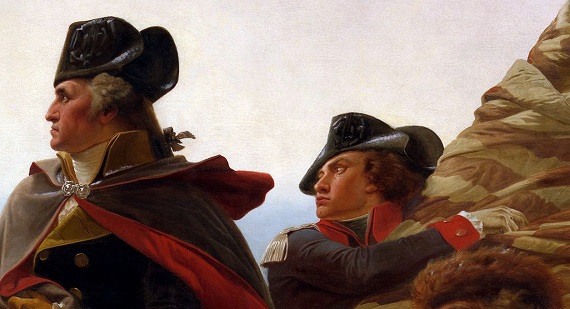James Monroe was born today (April 28) in 1757. He is one of the more misunderstood and maligned Presidents of the United States. Historians typically rank him as no better than “average.” This is unjust and an indictment of the historical profession. Monroe, they suggest, lacked leadership and energy in the executive office. He should have been more like Lincoln or F. Roosevelt, two “great” presidents according to their standards. One History Channel production suggested that the only positive thing to say about Monroe is that he was honest. Yet, if these historians ranked presidents based on the way the executive office was sold to the States during ratification, Monroe would be in the top ten, if not the top six or seven, of the men who have occupied that office.
But Monroe was more important to the fabric of American history than his time in the executive mansion. He was a hero of the American War for Independence and almost lost his life at the Battle of Trenton. He was Governor of Virginia and represented his home State in the Continental Congress and in the United States Senate; he served as Minister to both France and Great Britain and then as Secretary of War and Secretary of State; however, as with Jefferson, Washington, and other members of the founding generation, office and political station did not make the man. Monroe helped define American republicanism in the 1790s.
Monroe was elected to the 1788 Virginia Ratifying Convention and along with Patrick Henry, George Mason, and William Grayson opposed ratification. He feared that the “national” government would eventually trounce on the liberties of the people of the States and thus pushed for a bill of rights. Monroe argued that there should be a third branch of government charged with preventing “encroachments” on the people. The founding generation, Monroe included, thought the language of the Tenth Amendment would be enough. The States, then, could act as that hedge. They were promised that the States could ignore unconstitutional legislation. Unconstitutional laws were nonbinding. Later, while Jefferson and Madison drafted the famous Virginia and Kentucky Resolutions of 1798, Monroe helped plan the legislative tactics used to adopt the measures in the Virginia legislature, and Monroe’s farm was used as a meeting place in 1799 to shield Jefferson from Federalist spies intent on discovering who authored the legislation. Monroe believed in nullification and the compact fact of the Constitution, what proponents later called the “spirit of ’76.” From the record, one cannot logically argue that the idea was fabricated from thin air.
As president, Monroe maintained these principles in both foreign and domestic policy. It was during his administration that the Congress passed the Missouri Compromise, a piece of legislation Monroe would have vetoed had the Congress attempted to restrict slavery in the State of Missouri once it was admitted to the Union. State law was not subject to federal oversight, particularly in areas in which the Constitution was silent. If all States entered the Union on equal footing, and they did, then the general government could not dictate to a State what the people ratified in their State constitution. That was the true “fire bell in the night” Jefferson feared. As long as the State had a republican form of government, the federal government could not constitutionally interfere with its domestic politics. Proponents of the rejected Tallmadge amendment (this would have prohibited slavery in the State of Missouri) thought otherwise, and their position eventually destroyed the Union of the Founders. The States became mere provinces of the general government. Now, even popularly amended State constitutions fall under the purview of some politically appointed Federal judge. The Founders, most importantly the Jeffersonsians including Monroe, would have never suffered under such a system.
Monroe vetoed an internal improvements bill because he did not think the Constitution authorized the general government to build roads. He thought this power would be beneficial but urged the Congress to consider a constitutional amendment to grant such power. It has never done so, but funds from the general government build, repair, or improve thousands of miles of road each year.
Finally, Monroe supported a foreign policy that is the antithesis of the modern imperial system. The “Monroe Doctrine” of 1823 explicitly stated that the United States would remain disengaged from Europe in regard to both foreign and domestic policy. That had been the American position beginning with the Washington administration. As Jefferson wrote to Monroe in 1823, “Our first and fundamental maxim should be never to entangle ourselves in the broils of Europe….” Monroe agreed.
James Monroe should be held in high esteem, particularly from modern Jeffersonians. Like Jefferson, Monroe favored some legislation as president that betrayed his earlier principles, but that was a byproduct of the office. It was, and still is, easier for those out of power to snipe at the man in power. Monroe, however, never believed in an aggressive executive. He stayed consistent to a policy of limited executive involvement in the legislative arena. The president was not the chief legislator. He could offer his opinion on legislative matters, but he was never to set the agenda.
Ultimately, Monroe believed in principles that are as foreign to modern America as the federal republic of 1776 and the Constitution as ratified in 1788. Perhaps Monroe’s birthday should be regarded as a wake rather than a celebration. He was the last of the founding generation to serve as president. Their republic died with the election of John Quincy Adams in 1824. We just keep piling dirt on its grave.






